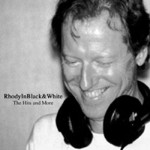social bookmarking tools:
 |
|
| Available RSS Feeds |
|---|
 - Top Picks - Top Picks |
 - Today's Music - Today's Music |
 - Editor's Blog - Editor's Blog
|
 - Articles - Articles
|
Add Louisville Music News' RSS Feed to Your Yahoo!
|
The Songwriter's Schoolhouse
Rhody in Black & White: The Hits and More (Ashwood Recordings)
Alan Rhody
By Tim Roberts
By Tim Roberts
Welcome to Songwriting 101. Today, class, we're going to review the career of former Louisvillian and singer-songwriter Alan Rhody, whose songs over the last thirty-five years have been performed by a number of country and pop luminaries such as George Jones, The Atlanta Rhythm Section, Tanya Tucker and the Oak Ridge Boys, just to name a few, including himself. And please pay attention. There may be a test at the end.
Yes, question in the back row? Speak up, please. No, not the Okrich Boys. O-A-K-R-I-D-G-E-B-O-Y-S. Got it? Good.
Your reference material for today's lecture is the latest from Mr. Rhody, a complete career retrospective called Rhody in Black & White: The Hits and More. Yes, you may peel off the shrink-wrap now. Notice that it contains two sections: Acoustic Set, where the instrumentation is all acoustic and the Electric Set, where the ... well, you get the idea. Each track listed on the back of the case is dated, showing exactly how long Rhody has been a singer-songwriter. The first track, "My Kentucky" is from 1970 and "River Town," was recorded in 2004. So we're dealing with a span of time longer than most marriages last.
Another question from the back row? Speak up, please. No, Tucker. T-U-C-K-E-R.
So what makes Mr. Rhody's work worth studying and listening to? Why is his work covered in our songwriter's syllabus? One primary reason:
Like his many contemporaries such as John Prine, Lucinda Williams, Tim Krekel and even Billy Joel or Bernie Taupin, Rhody knows that a song is a conversation, whether the performers are addressing themselves, someone else, or the entire cosmos. That's important because it draws you in as a participant in the music. It engages your ears and seeks out and latches onto that place in your brain that hypnotically compels you to listen. Good storytellers do that.
Plus it touches on common experience. You've doubtlessly been in dingy bars where there's always the one heartbreakingly attractive person looking for an intimate friend for the night. That's what you'll hear in "Tuesday Night Local," where Rhody vacillates between leaving her alone, since he knows the game she's into and the game of excuses he'll probably play when he gets to her home and walking out the door with her and going through with the game anyway, just salve his own loneliness.
Or how about the tale of two lovers in "I'll Be True to You," who make that vow to each other when they're young, but go their separate ways, fall in and out of relationships, until the man is on his knees at his old lover's deathbed, making the promise all over again. It's the song the Oak Ridge Boys made famous. Or "Grandpa's Boots," where Rhody shares the memories of his grandfather, visiting his house and sitting in front of the TV while his grandfather dozes behind him in an easy chair. The imagery is so vivid that, as you listen, you can almost smell grandpa's stale pipe smoke and Wildroot hair cream.
Yes, you in the back row again? No, hair cream. What is it? You got a grandpa? Or an old barber in your neighborhood? Ask them.
In addition, Rhody performs all his songs in a rich, butterscotchy voice that perfectly transmits the emotions behind the songs. Which brings up a second reason why Rhody's songs should be studied: If you can write 'em, be sure you can sing 'em.
So if you take away anything from this session, class, make sure it is this: Your songs must be a conversation with the listeners and the best songs that are the ones that involve the listeners, where any one man or woman who hears the song can say, "Yeah, that's me." Or, "Yeah, that was my grandpa, too."
Alan Rhody is one of the masters of that conversation.
Class dismissed.
(For continuing education, visit www.alanrhody.com.)

